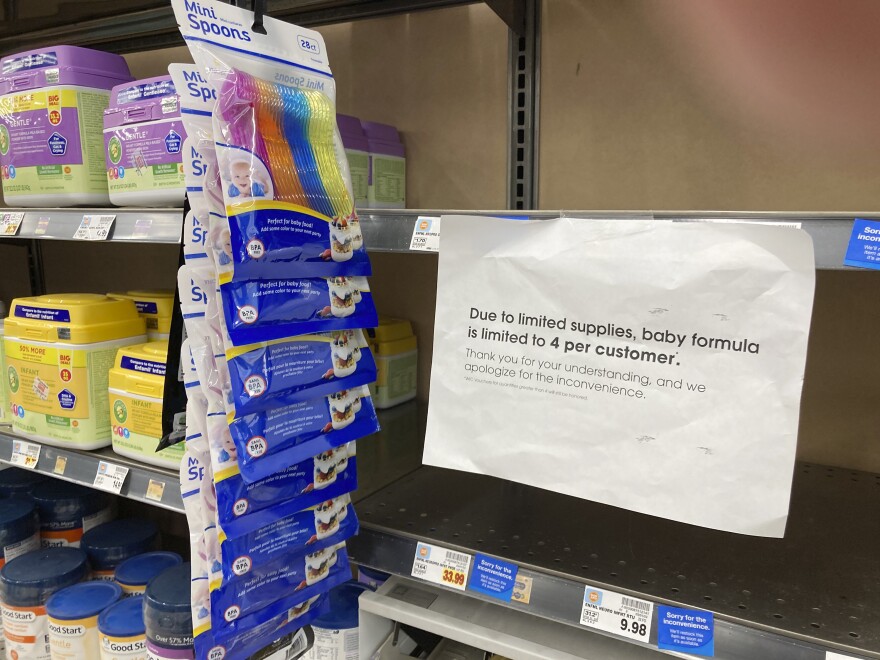For the last week, Samantha Martinez has been burning through gas and driving around to different stores in Connecticut looking for baby formula.
And even when she did find one with some product in stock, it’s been underwhelming.
“There was not much of a selection to choose from, and even so, there was only like one or two cans of certain formulas,” Martinez said. “It hit me, like, oh my gosh, this is getting real.”
A national shortage of baby formula – the result of a major product recall and supply chain issues – has left Connecticut parents like Martinez scouring the internet and local businesses for formula they need to feed their children.
Just about a third of Connecticut babies are exclusively fed breastmilk through 6 months old, according to the most recent CDC survey data.
It means the majority of other parents rely on baby formula to some degree – either as a supplement to human breast milk or for 100% of their baby’s feeding needs.
That’s why Dr. Jody Terranova, a pediatrician, said the current shortage is hitting so many families at once.
“Especially families that use specialized formulas for children who have allergies or medical conditions, where they need special formula,” she said. “They’re having a harder and harder time finding those formulas.”
According to a report by Datasembly, a retail data firm, the nationwide out-of-stock rate for baby formula reached 43% as of May 8. Around this time last year, only about 2% to 8% of formula was out of stock, the firm reported.
Just last month, Datasembly showed that Connecticut had some of the highest out-of-stock rates in the country, particularly in the greater metro area of Hartford-New Haven.
Martinez, who lives with her family in Vernon and works during the week, called the situation stressful and frustrating. She explained how she’s often on the hunt for a specific type of formula for her almost 6-month-old son, Trentyn.
“It is pretty aggravating when you’re running from store to store, lugging a baby with you, and you can’t find what you need,” she said, adding that it has become a financial burden for her family, too.
Terranova, president-elect of the American Academy of Pediatrics Connecticut chapter, said there are some options families can turn to.
Pediatricians, other health providers and pharmacies are working directly with formula manufacturing companies to help connect families to supply, especially if they need very specific types of formulas meant for babies with medical conditions.
Terranova recommends against making homemade formula “because we’re not really sure where people are getting the recipe from.” There are also concerns about possible contamination and nutritional imbalance.
The U.S. Food and Drug Administration also advises against making infant formula at home.
Terranova said parents also should not water down their formula. An unbalanced ratio of formula powder to water could lead to babies being low in salt and at risk of having seizures, Terranova said.
“If you have to make a choice, because you’re feeling desperate, let’s make sure that we work together to make the best choice for your child before you do something that could be harmful in the long run," she said.
Many parents have formed communities on social media to sell or offer excess formula, and find leads on which stores have certain products in stock.
A Facebook group called Find My Formula CT has become a go-to resource for some Connecticut families. The group has more than 2,000 members.
“It really exploded,” said Rachel Wrightington, who initially created the group a couple months ago, before the national shortage, just as a way to make it easier for parents to find formula in general.
She’s a mom of two in Southington and has a 5-month-old who needs specialty formula.
“I work a full-time job. I can’t always get to the store when some of my friends tell me they have it,” she said. "So by the time I would get out of work, it’d be gone.”
Wrightington herself hasn’t escaped the stress of the shortage, once having called 10 stores in the same night to see if any had the formula she was looking for – they didn’t.
But that’s where the Facebook group has helped, she said.
“Now that there’s so many members, there’s bound to be someone that can help you,” Wrightington said. “Even if it’s just with one can or one pre-made bottle, there’s always something.”
Health providers note that people who were already vulnerable and under-resourced – by their income, health insurance status, place of residence and other factors – are likely to be disproportionately impacted by the shortage.
“[They] aren’t necessarily able to go out and pay more for formula if they need to, and they don’t always have the time to be scouring online or calling places or driving to a number of different stores,” Terranova said.
Residents eligible for the Special Supplemental Nutrition Program for Women, Infants and Children, known as WIC, should contact their local agency offices about available supply, Terranova said.
Martinez said it’s been encouraging to see so many providers and parents helping each other out during this time. But she also called it heartbreaking.
“There are moms who truly have nothing, who may not have the financial resources to drive from place to place in order to get the formula they need, and to buy in advance as well,” she said. “I just think it’s heartbreaking all around.”
The Biden administration and the FDA have released plans to increase the supply of baby formula on the market.
Connecticut Attorney General William Tong warned families of possible price gouging and scams. In a statement, he urged caution when buying from individual or private sellers. Residents can report these instances to the attorney general’s office or local police.


